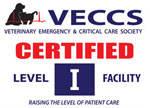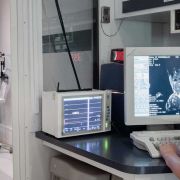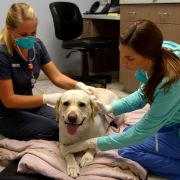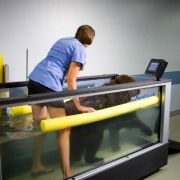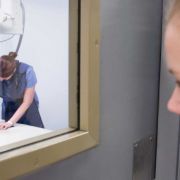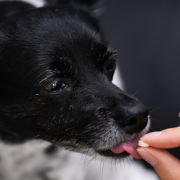Date:
Charleston Veterinary Referral Center is excited to be at the forefront of breakthrough technology, and to be able to offer our patients the best care available. When your pet has cancer, we understand that each day is precious, and the most advanced treatments can mean the difference between losing your best friend, and enjoying more time together. Our oncology department is pleased to offer two new cancer treatments to our cancer-fighting arsenal. Both treatments use advanced, state-of-the art technology, to target cancer in new ways.
Adoptive cell therapy for pets
What better way to fight cancer than to amplify a pet’s own defenses? Adoptive cell therapy uses a pet’s own immune system to fight cancer cells. Your pet’s immune cells are harvested, sent to a laboratory for processing, then infused back into their body, using these steps:
- Step #1: Cell harvesting — A blood sample is collected from your pet, and sent to a laboratory for processing.
- Step #2: Processing — At the lab, specific cells from your pet’s blood sample are isolated and modified. T-cells and natural killer cells that typically attack foreign cells are activated, multiplied, and genetically modified to target specific tumor-associated antigens associated with your pet’s cancer type. Generating an adequate number of cells to effectively attack your pet’s cancer can take from 3 to 12 weeks.
- Step #3: Cell infusion — The activated cells are injected back into your pet’s bloodstream, where they will flow throughout their body, searching for the cancer cells they have been programmed to attack. Your pet will receive two or three infusions spaced one to two weeks apart, depending on the number of cells harvested.
Which pets are candidates for adoptive cell therapy?
Adoptive cell therapy may be a component of your pet’s cancer treatment protocol if one of the the following cancer types is present:
- B-cell lymphoma
- Rescue B-cell lymphoma
- Hemangiosarcoma
- Osteosarcoma
- Anal sac carcinoma
After diagnosing your pet’s cancer type, our veterinary oncologists will determine whether adoptive cell therapy could be a helpful component of their treatment.
How does adoptive cell therapy compare to other cancer treatments?
Prior to the advent of new treatment types, most cancers were treated with a combination of surgery, chemotherapy, and radiation. While these are still effective treatment methods, adoptive cell therapy offers another modality that can be added to treatment protocols to increase success rates based on studies performed in humans—promising canine studies are still ongoing. For example, most lymphomas in dogs are treated with chemotherapy, which leads to the patient’s remission for six to nine months, on average. By adding adoptive cell therapy to a treatment protocol, remission periods may be extended, and overall survival time and quality of life improved.
FidoCure for pets
FidoCure is a process that sequences the DNA in a pet’s tumor cells to identify mutations that can be targeted by specific chemotherapy drugs. Instead of using traditional chemotherapy medications that kill all rapidly dividing cells in a pet’s body, chemotherapy drugs that specifically target your pet’s tumor cells can be administered.
How is FidoCure performed?
Your pet’s tumor cells will be analyzed to identify cancer mutations, so we can choose targeted chemotherapy drugs that will be most effective. The steps of this process are:
- Step #1: Tumor cell collection — Your pet’s tumor is biopsied while your pet is sedated or anesthetized, and the piece of tumor that we take is sent to the FidoCure laboratory for analysis.
- Step #2: DNA sequencing — The DNA in your pet’s cancer cells is sequenced to identify the cancer type and genetic mutations that can be targeted by chemotherapy medications.
- Step #3: Chemotherapy recommendations — We partner with FidoCure veterinarians to formulate a chemotherapy plan that includes medications that specifically target your pet’s cancer cells.
- Step #4: Chemotherapy administration — Oral chemotherapy medications are prescribed that can typically be administered by you at home.
Pets with all tumor types may be eligible for FidoCure treatment. Many different cancer types have been successfully treated, including:
- Splenic hemangiosarcomas
- Transitional cell carcinomas
- Mast cell tumors
- Soft-tissue sarcomas
- Osteosarcomas
- Melanomas
- Histiocytic sarcomas
- Lymphomas, including B-cell lymphoma
- Anal sac carcinomas
- Squamous cell carcinomas
- Pulmonary adenocarcinomas
- Mammary tumors
If your pet has a tumor, our oncology team will determine whether they are a candidate for FidoCure tumor DNA sequencing and treatment.
If your family veterinarian has diagnosed your pet with cancer, and you are concerned about the limitations of conventional treatments, contact us to see if our new therapies can give you more time together.



